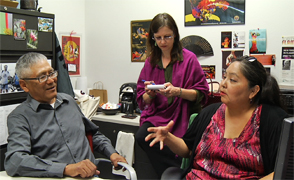Principal Investigators
- Agnes Attakai, Co-Principal Investigator
- Kerstin M. Reinschmidt, Co-Principal Investigator
Contact Information
Agnes Attakai, UA
agnesa@email.arizona.edu (520) 626-4727Documenting and Promoting Resilience in Urban American Indians
 CAIR researchers Kerstin Reinschmidt (center) and Agnes Attakai (right) are working with Navajo elders like Nolando Neswood (left) to gather stories about resilience
CAIR researchers Kerstin Reinschmidt (center) and Agnes Attakai (right) are working with Navajo elders like Nolando Neswood (left) to gather stories about resilience For American Indians (AI), resilience is one of many responses to historical trauma experiences. However, the majority of existing studies on historical trauma responses has focused on deficiencies and pathologies. There are few empirical studies of American Indian resilience and even fewer conducted from the perspective of American Indian Elders. This pilot study differs from previous investigations of historical trauma among American Indians in that it:
- Focuses on resiliency and historical trauma from the perspective of elders (55 years and older)
- Views resiliency as a potential adaptive process rather than a set of fixed attributes
- Focuses on protective factors and strengths of urban American Indian cultures rather than deficiencies in the context of historical trauma
Our community based participatory research (CBPR) approach builds on a five-year partnership with the Tucson Indian Center (TIC) that serves a culturally heterogeneous American Indian urban community and has actively participated in CBPR with the University of Arizona.
Qualitative interviews that may be audio- or video-recorded will document the life narratives of urban AI Elders and serve as a basis for identifying resilience strategies. The findings will be used to develop a health promotion program that will consist of a series of 12 monthly workshops on historical trauma and resilience in collaboration with the Elders, the Tucson Indian Center (TIC) Community Advisory Board, and the TIC staff. The workshops will provide the opportunity for the urban American Indian community to explore the ways of overcoming historical trauma for a healthy future. Each of 12 workshops may focus on specific protective factors, assets and resources identified in the interviews, such as family strength, support networks, spirituality and traditional healing.
Goal
The goal of the UA research project is to document and disseminate resilience strategies to cope with historical trauma.
Approach
- Community based participatory research (CBPR)
- Traditional storytelling including individual life narratives of resilience from urban Elders ages 55+
Outcomes
- Health promotion model fostering resiliency which builds upon the lived experiences of urban AI Elders
- Creation of twelve 30-minute videos with accompanying workbooks and interview excerpts
Specific aims
- Identify resilience strategies by gathering urban AI Elders’ life narratives
- Collaboratively design a series of 12 bi-monthly workshops on historical trauma, resilience, and adaptive strategies for urban American Indians (collaboration between Elders, Advisory Board, and TIC staff)
- Implement and evaluate the 12 bi-monthly workshop series
Activities and timeline
Identify resilience strategies in life narratives (February – July 2013)
- Digital story training
- Focus group to develop interview guide
- Interview and videotape elders
- Produce videos
Collaboratively design 12 bi-monthly workshops (August 2013 – January 2014)
- Hold forum to present research data
- Hold collaborative meetings to develop workshops
- Prepare multi-media presentations
Implement bi-monthly workshops (February – October 2014)
- Implement workshops
- Evaluate workshops
Data Analysis (January 2014 – February 2015
- Complete data analysis
- Evaluate lesson plans
- Conduct workshops on lesson plans